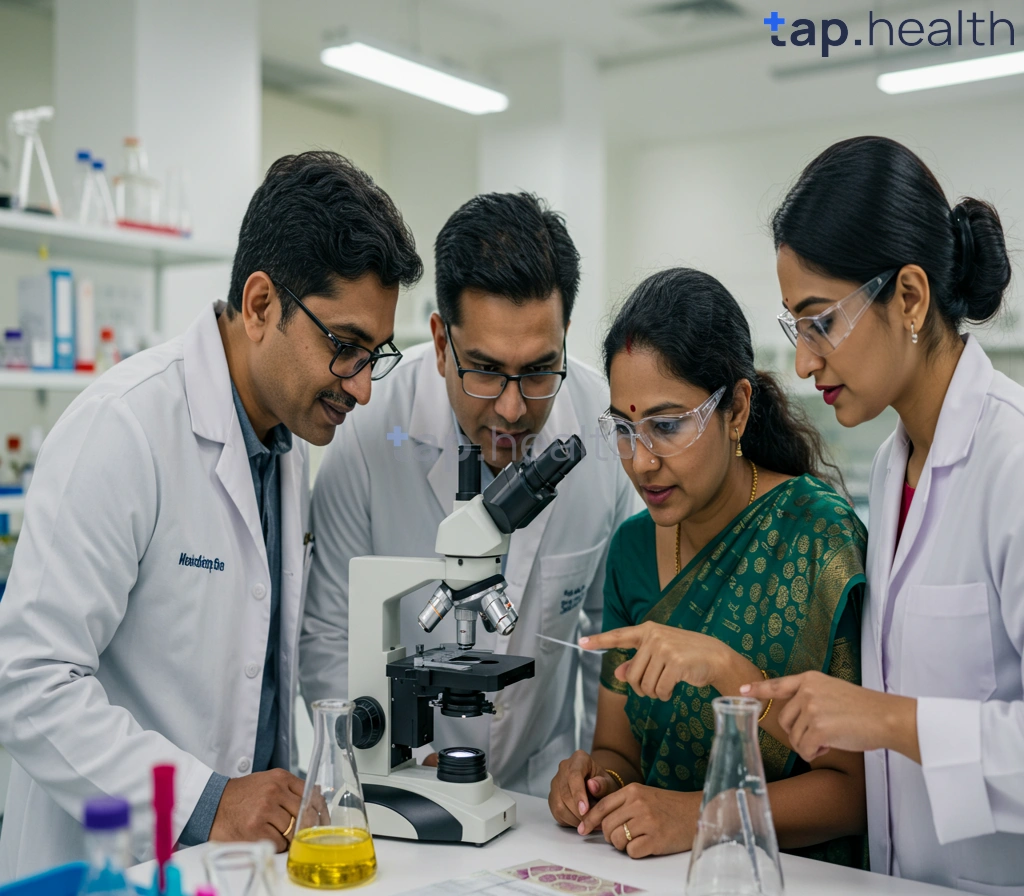Table of Contents
- Islet Regeneration Lab: Research Overview and Latest Discoveries
- Exploring Islet Regeneration: A Comprehensive Research Guide
- Islet Regeneration Lab: Methods, Challenges, and Future Directions
- What is Islet Regeneration? A Look at Current Lab Research
- Islet Cell Regeneration: Promising Research from Leading Labs
- Frequently Asked Questions
- References
Imagine a future where type 1 diabetes is no longer a lifelong struggle with daily injections. That future is closer than you think, thanks to groundbreaking research in islet cell regeneration. This blog post provides an overview of the exciting work being done at the Islet Regeneration Lab, a leading facility pushing the boundaries of this field. We’ll delve into their innovative techniques and the potential impact on millions suffering from this debilitating disease. Learning about their progress will give you a better understanding of the hope on the horizon for a cure. Let’s explore what makes the Islet Regeneration Lab such a vital player in the fight against diabetes.
Islet Regeneration Lab: Research Overview and Latest Discoveries
The fight against diabetes, particularly Type 2, is gaining momentum with groundbreaking research in islet regeneration. Understanding this process is crucial, especially in regions like India and other tropical countries where diabetes prevalence is high. Islet regeneration, focusing on the pancreatic cells responsible for insulin production, offers a potential path towards a cure or significant disease management improvement. Current research explores various avenues to stimulate the body’s natural regenerative capabilities, aiming to replace damaged or malfunctioning islets. This approach holds immense promise, as up to 80% of Type 2 diabetes cases can be delayed or prevented through lifestyle changes, according to recent studies, making research into regeneration even more impactful.
Challenges and Opportunities in Tropical Climates
While promising, challenges remain, especially in tropical climates. Factors such as dietary habits, genetic predispositions common within certain populations, and the impact of environmental conditions on islet function need specific consideration. Further research tailored to the unique needs of Indian and other tropical populations is vital to optimize regeneration strategies. This involves understanding the interaction between lifestyle factors such as diet and activity levels, genetics, and the effectiveness of regenerative therapies. The potential for early interventions and preventative measures is particularly significant given the high prevalence of Type 2 diabetes in these regions. Understanding the role of genetics in disease susceptibility is crucial, much like understanding the impact of isotopes in cancer treatment, where genetic factors play a significant role in treatment response.
Looking Ahead: Actionable Steps
The Islet Regeneration Lab’s research underscores the importance of continued investment in diabetes research and preventative healthcare. While a complete cure remains a long-term goal, advancements in islet regeneration significantly improve disease management. For individuals in India and tropical countries, adopting a healthy lifestyle—including a balanced diet rich in fruits and vegetables and regular physical activity—is paramount. Staying informed about the latest developments in islet regeneration research is crucial for empowering individuals and communities to proactively manage their diabetes risk. Consult your doctor for personalized advice. Maintaining a healthy lifestyle is also essential in preventing waterborne illnesses, such as those caused by cysts. Proper water purification methods are vital for maintaining good health.
Exploring Islet Regeneration: A Comprehensive Research Guide
The global diabetes epidemic is a stark reality, with the number of people affected soaring from 200 million in 1990 to a staggering 830 million in 2022, according to the World Health Organization (WHO). This dramatic increase underscores the critical need for innovative treatments, particularly focusing on islet regeneration. In Indian and tropical countries, where diabetes prevalence is rising rapidly due to factors like lifestyle changes and genetic predisposition, research in this area is particularly vital.
Current Research Approaches in Islet Regeneration
Several promising avenues are being explored in islet regeneration research, including the use of stem cells to differentiate into insulin-producing beta cells, and the development of bioartificial pancreas devices to support or replace islet function. These techniques offer the potential to significantly improve the lives of millions suffering from type 1 and type 2 diabetes. Research is also focusing on identifying and manipulating specific genes and pathways involved in islet development and regeneration, potentially offering a more targeted approach to therapy.
Islet Regeneration and its Relevance to Tropical Climates
The high prevalence of diabetes in tropical regions like India presents unique challenges and opportunities for islet regeneration research. Factors such as variations in genetic predispositions, environmental influences, and dietary habits necessitate region-specific research to optimize treatment strategies. Understanding these regional differences is key to developing effective and accessible therapies. Maintaining proper hydration and electrolyte balance is also crucial for overall health, especially in managing conditions like diabetes.
Call to Action: Supporting Research in India and Tropical Countries
The fight against diabetes requires a concerted global effort. Investing in and supporting research initiatives focused on islet regeneration in India and other tropical countries is not just crucial for improving healthcare outcomes; it’s a moral imperative. By advancing islet regeneration therapies tailored to these regions’ specific needs, we can significantly impact the lives of millions and pave the way for a healthier future. Let’s work together to accelerate progress in this critical area of medical research. A healthy lifestyle, including proper nutrition, is vital for managing diabetes. Consider exploring muscle recovery meals for a balanced diet, though this is not directly related to islet regeneration, it’s still important to consider overall health.
Islet Regeneration Lab: Methods, Challenges, and Future Directions
Current Methods in Islet Regeneration Research
The global quest for effective diabetes treatment is intensifying, particularly in regions like India and other tropical countries where diabetes prevalence is high. A significant focus is on islet regeneration, offering the potential to reverse type 1 diabetes and significantly improve the lives of millions. Current methods explore stem cell therapy, utilizing pancreatic progenitor cells or induced pluripotent stem cells (iPSCs) to differentiate into insulin-producing islet cells. Another promising avenue is bioengineering, creating artificial islets or scaffolds to support islet growth and function. These advanced techniques hold immense promise for mitigating the devastating complications of diabetes, such as the alarmingly high rate of foot ulcers, affecting nearly 15% of diabetics globally. This includes a significant portion of the Indian and tropical populations where access to quality healthcare might be limited.
Challenges and Roadblocks
Despite significant advancements, significant hurdles remain. Islet transplantation, while successful in some cases, faces challenges including immune rejection, donor scarcity, and the complex procedure itself. Stem cell research is still evolving, with challenges in efficient differentiation, scalability, and ensuring the safety and efficacy of the generated islet cells. Funding constraints, particularly in resource-limited settings, pose another significant challenge. The high cost of advanced therapies often makes them inaccessible to a large segment of the diabetic population in many developing countries. Understanding the impact of diet on insulin response is also crucial; for example, see Dairy and Alternatives: Understanding Their Impact on Insulin Response for more information on dietary factors.
Future Directions and Regional Impact
The future of islet regeneration research lies in overcoming these challenges. This includes developing more efficient and cost-effective methods for stem cell differentiation, improving immune tolerance strategies to minimize rejection, and exploring novel biomaterials for islet encapsulation. Focusing research on the specific needs and prevalent diabetic complications in Indian and tropical countries will be crucial. This includes tailoring treatment strategies to address the unique challenges posed by climate, lifestyle, and access to healthcare. Increased collaboration between researchers, healthcare providers, and policymakers is essential to translate laboratory discoveries into accessible and affordable therapies for the region. Investing in local research infrastructure and training is crucial to build capacity and empower these communities. The complexities of managing related conditions, such as inflammatory bowel disease, also need consideration. For insights into managing How to Treat Inflammatory Bowel Disease, please refer to this related resource.
What is Islet Regeneration? A Look at Current Lab Research
Islet regeneration, the body’s natural process of replacing damaged insulin-producing beta cells in the pancreas, is a key area of focus in diabetes research, especially crucial for regions like India and other tropical countries facing a high burden of type 2 diabetes. Over 80% of Type 2 diabetics have insulin resistance as a key underlying factor, highlighting the urgent need for effective strategies to restore pancreatic function. Current lab research explores several promising avenues, focusing on stimulating the body’s inherent ability to regenerate these vital cells.
Stimulating Islet Cell Proliferation
One major research focus involves identifying and utilizing growth factors and signaling pathways that can trigger the proliferation of existing beta cells. This approach aims to increase the number of insulin-producing cells, thus improving glucose control and reducing the reliance on external insulin therapy. Researchers are also investigating the role of specific nutrients and medications in enhancing this natural regenerative process. This is particularly important in regions with varied dietary habits and access to healthcare. Understanding the role of inflammation in the body is also crucial; for instance, Reducing Inflammation with Specific Juice Ingredients can sometimes help in managing related health conditions.
Harnessing Stem Cell Technology
Another exciting area of research involves the use of stem cells, both embryonic and adult, to differentiate into functional beta cells. This technology holds the potential to generate a virtually unlimited supply of insulin-producing cells for transplantation, offering a groundbreaking solution for individuals with severely impaired pancreatic function. The success of this approach will be crucial for countries with limited access to advanced medical treatments. Clinical trials assessing the safety and efficacy of these techniques are ongoing, and their success could dramatically impact diabetes management.
Improving Islet Transplantation Outcomes
While islet transplantation is currently a viable treatment option for some individuals, research is underway to improve the procedure’s success rate and minimize rejection risks. This includes exploring strategies to enhance islet survival and function post-transplantation. The availability of this advanced procedure, and future improved versions, is critical in achieving better outcomes for diabetes in diverse populations across various regions. It’s important to note that pancreatic health is interconnected with other systems in the body; for example, issues such as Understanding the Process: How Are Gallstones Formed can sometimes indirectly affect overall health.
In conclusion, islet regeneration research offers immense hope for millions affected by diabetes, especially in high-prevalence regions like India and other tropical countries. Continued investment and research in this field, focusing on regionally-specific challenges and healthcare access, is vital for improving the lives of those struggling with this chronic disease.
Islet Cell Regeneration: Promising Research from Leading Labs
The Urgent Need for Islet Regeneration Research in India
The alarming rise in youth-onset diabetes in India, increasing by 4% annually, particularly in urban areas, underscores the urgent need for breakthroughs in islet cell regeneration. This escalating health crisis necessitates focused research and development within the Indian context, considering the unique environmental and lifestyle factors contributing to this surge. Islet regeneration research offers a potential cure, moving beyond the limitations of current treatments like insulin therapy. Understanding the mechanisms behind islet cell failure and developing effective regeneration strategies is crucial for improving the lives of millions. Maintaining a healthy immune system is also crucial in managing diabetes, and you can learn more about Immune-Boosting Meals for All-Year Health to support your overall well-being.
Promising Avenues in Islet Regeneration
Several labs worldwide are exploring innovative approaches to islet regeneration. These include stem cell therapy, which aims to generate new islet cells from pluripotent stem cells; bioartificial pancreas research, which focuses on creating implantable devices containing functional islet cells; and advancements in gene therapy to correct genetic defects hindering proper islet function. The success of these approaches hinges on addressing the challenges unique to tropical climates and the prevalence of specific diabetes risk factors in India.
Next Steps: Supporting Islet Regeneration Research in India
The future of diabetes management in India and other tropical countries rests on fostering increased investment in, and collaboration around, islet cell regeneration research. This includes supporting indigenous research initiatives, promoting collaborations between Indian and international research institutions, and creating awareness around the crucial role of preventative measures in mitigating the diabetes epidemic. By supporting these efforts, we can pave the way for a future where diabetes is no longer a life-altering disease. While this research focuses on preventing diabetes, understanding circulatory issues is also vital. Learn more about recognizing and treating serious conditions like Treat Blood Clot in the Brain.
Frequently Asked Questions
Q1. What is islet regeneration research and how could it help manage type 2 diabetes?
Islet regeneration research focuses on restoring the body’s ability to produce insulin by replacing damaged pancreatic cells. This offers a potential cure or significant improvement for managing type 2 diabetes, especially important in areas with high prevalence rates.
Q2. What are the main challenges in developing islet regeneration therapies, particularly in tropical regions?
Challenges include adapting therapies to diverse dietary habits and genetic factors, accounting for environmental conditions in tropical climates, and overcoming hurdles like immune rejection, donor scarcity, cost, and accessibility of advanced treatments.
Q3. What are some of the promising approaches being explored in islet regeneration research?
Promising avenues include stem cell therapy, bioengineered islets, and gene therapy, all aimed at replacing or repairing insulin-producing cells.
Q4. What are the potential limitations or concerns associated with islet regeneration therapies?
Potential limitations include the challenges of immune rejection of transplanted cells, the scarcity of suitable donors for certain approaches, the high cost of some therapies, and ensuring equitable access to these treatments.
Q5. What is the future direction of islet regeneration research, and what is needed to make these therapies widely available?
Future directions involve developing more efficient and affordable methods, improving immune tolerance, and tailoring research to specific needs in different regions. Increased investment and collaboration are crucial to translating research into accessible and affordable therapies.
References
- Electronic Health Records-Based Data-Driven Diabetes Knowledge Unveiling and Risk Prognosis : https://arxiv.org/pdf/2412.03961
- Cross Feature Fusion of Fundus Image and Generated Lesion Map for Referable Diabetic Retinopathy Classification: https://arxiv.org/pdf/2411.03618





